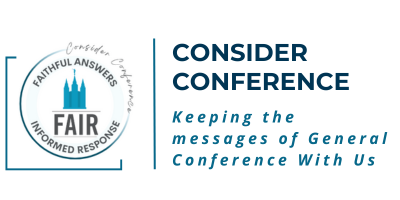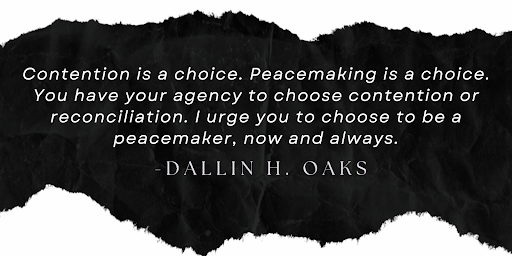
In a world filled with heated debates, divisive rhetoric, and increasing hostility, how can followers of Jesus Christ navigate discussions with love and clarity? Is it possible to stand firm in faith without contributing to contention?
In his talk Following Christ, President Dallin H. Oaks reminds us that discipleship is a continuous commitment, not an occasional practice. He teaches that to truly follow Christ, we must anchor ourselves in covenants and uphold His commandments, even when the world pressures us otherwise.
A key focus of his message is Christ’s invitation to forgo contention and become peacemakers. President Oaks highlights how the Savior’s teachings—especially His commandment to love one another—should shape our interactions in an era of division. He warns against the destructive nature of hostility in political and personal discourse, urging members of the Church to choose reconciliation over conflict.
By following the Savior’s example and embracing the doctrine of Christ, we can stand as light to the world—defending truth with compassion, conviction, and kindness.
Doctrine: The Role of Commandments in Discipleship
Question: Are commandments restrictive, limiting personal freedom and spiritual growth?
Some argue that religious commandments act as constraints, preventing individuals from experiencing personal freedom and self-discovery. They see obedience to divine laws as outdated or unnecessary in today’s world.
Response:
President Oaks uses the analogy of a kite string to illustrate that commandments are not restrictions but essential guiding forces in our spiritual journey. Just as a kite needs a string to stay grounded and soar higher, commandments connect us to God and keep us from being tossed by worldly influences. Rather than limiting us, they empower us to grow, develop, and receive divine blessings.
Common Fallacies:
False Equivalence (Assuming Two Things Are the Same When They Are Not)
-
- Some assume that defending truth requires contention, equating conviction with argument. Others believe that avoiding contention means remaining silent or compromising faith. However, President Dallin H. Oaks clarifies that disagreement itself is not the problem—it’s how we engage. Christ boldly taught truth without hostility, demonstrating that disciples can be both firm and kind. True peacemakers stand for doctrine while choosing patience, persuasion, and love over antagonism.
Straw Man: (Misrepresenting an Argument to Make It Easier to Attack)
-
- Some claim that President Dallin H. Oaks’ call to reject contention means disciples must stay silent or avoid standing for truth. This misrepresentation – the “straw man” – makes it easier to criticize the idea of peacemaking as weakness or passivity. However, he clarifies that forgoing contention is not about avoiding hard conversations but engaging with wisdom and love. Christ boldly taught truth without hostility, showing that disciples can defend their faith while choosing patience, persuasion, and respect.
Confirmation Bias: (Favoring Information That Supports Preexisting Beliefs While Ignoring Contradictory Evidence)
-
- Some assume that commandments are restrictive and limit personal freedom, focusing only on what they perceive as sacrifices while ignoring the spiritual growth and blessings that come from obedience. This reflects confirmation bias because it selectively acknowledges only the challenges of keeping commandments while dismissing evidence of the joy, strength, and divine guidance they provide. President Dallin H. Oaks counters this by comparing commandments to a kite string—something that may seem restrictive but actually enables us to soar. To challenge this bias, disciples can share personal experiences or scriptural examples where obedience has led to increased freedom, peace, and happiness, helping others see the fuller picture.
Social Issues: Contention in Public Discourse
Question: Does avoiding contention mean compromising truth and remaining silent in the face of opposition?
Some believe that choosing peace means avoiding difficult conversations or failing to defend one’s beliefs. Critics may argue that forgoing contention is a sign of weakness or that the Church encourages members to remain passive in the face of attacks.
Response:
President Oaks makes it clear that being a peacemaker does not mean compromising truth. Christ Himself never avoided difficult topics but always addressed them with love and wisdom. As disciples, we are called to defend our beliefs with clarity and conviction, but without hostility. Peacemaking is a choice that allows us to maintain both truth and Christlike love in all interactions.
Common Fallacies:
False Equivalence: (Assuming Two Things Are the Same When They Are Not)
Many assume that contention and conviction are the same, but President Oaks clarifies that we can stand firm in faith while still choosing peaceful dialogue.
Ad Hominem Attacks: (Attacking the Person Instead of Addressing the Argument)
The ad hominem fallacy occurs when someone attacks a person’s character instead of addressing their argument. Some dismiss peacemakers as weak or unwilling to stand for truth rather than engaging with their message. President Dallin H. Oaks teaches that choosing peace is not a sign of weakness but of spiritual strength and maturity. Christ Himself commanded His followers to reject contention (3 Nephi 11:29-30), demonstrating that true disciples defend truth while treating others with love and respect.
Recognizing Ad Hominem Attacks in Political Conversations
- Ask yourself: Am I engaging with someone’s actual position, or am I dismissing them based on their political identity?
- Example: Instead of saying, “They’re just a brainwashed liberal/conspiracy-theorist conservative,” try, “I may not agree with their view, but let me try to understand their reasoning.”
- Watch for phrases like:
- “They’re not a real Latter-day Saint if they believe that.”
- “They just want to destroy America/the Church/traditional values.”
- “They’ve been completely deceived by the media/propaganda.”
- “You can’t be a faithful member of the Church and vote that way.”
- Solution: Focus on principles over political labels. Instead of assuming someone’s faithfulness or intelligence based on their stance, engage with their reasoning.
- “I think we both care about fairness and integrity—how do you see that playing out in this issue?”
- “We may prioritize different policies, but I know we both want what’s best for our communities and families.”
- “I can see why that’s important to you. Here’s how I approach it from my perspective.”
When we prioritize love and mutual understanding over political divisions, we live up to President Oaks’ counsel to reject contention while standing firm in our values. Our discipleship should be evident in how we treat others—even those we strongly disagree with.

Defending Divine Doctrines: The Doctrine of Peacemaking
Explanation of Doctrine:
President Dallin H. Oaks emphasizes that followers of Christ are called to be peacemakers and to reject contention. This teaching originates from Christ Himself, who declared: “He that hath the spirit of contention is not of me, but is of the devil” (3 Nephi 11:29). The Savior also taught, “Blessed are the peacemakers: for they shall be called the children of God” (Matthew 5:9). President Oaks reminds us that avoiding contention does not mean compromising truth but rather choosing love and civility in all interactions. True disciples engage in respectful dialogue, defending truth without resorting to anger or hostility.
How This Doctrine Defends Core Beliefs:
- The doctrine of peacemaking refutes the misconception that standing for truth requires aggressive confrontation. Some believe that boldness in defending faith must involve harsh rhetoric or heated debates. However, Christ modeled a different approach: He taught with clarity and power while maintaining compassion and respect for those who opposed Him.
- This doctrine also clarifies that peace is not passivity. Critics argue that avoiding contention means remaining silent or failing to defend faith. However, President Oaks teaches that peacemakers are active participants in discussions about faith—but they choose persuasion, patience, and love over divisiveness. The gospel invites engagement, not retreat.
- Many assume that peacemaking means compromising moral values or avoiding tough conversations. However, Christ’s example shows that one can be both firm in doctrine and charitable in discourse. Peacemakers do not ignore issues; they engage with wisdom, seeking resolution rather than conflict.
Application
- Use Christlike language: When discussing faith online or in person, focus on truth rather than personal attacks.
- Seek common ground: Begin conversations by identifying shared beliefs before addressing differences.
- Model patience: When faced with hostility, respond calmly and with charity, as Christ did before His accusers.
Historical and Doctrinal Connections
Contextual Background:
The principle of forsaking contention has deep roots in both biblical and Book of Mormon history. Ancient prophets repeatedly warned against division and conflict among God’s people. The Nephites, for example, fell into destruction not because of external enemies alone, but because of internal contention and pride (Helaman 4:1-3). Similarly, in Christ’s ministry to the Nephites, His first major teaching was to put away contention (3 Nephi 11:29-30), demonstrating that unity is foundational to discipleship.
Throughout Church history, modern prophets have echoed this call. President Russell M. Nelson’s recent plea for peacemakers (“Peacemakers Needed,” April 2023) directly aligns with President Oaks’ message. Both leaders emphasize that standing for truth and choosing peace are not mutually exclusive. The principle remains unchanged: God’s people are called to defend faith without descending into strife.
Doctrinal Connection to Come, Follow Me: Trusting in the Lord’s Wisdom
- “God’s wisdom prepares us for unseen challenges.” The Lord provided an alternate record centuries before the 116 pages were lost. Likewise, His command to forgo contention shields us from spiritual pitfalls we may not immediately see.
- Doctrine & Covenants 10:5 teaches, “Pray always, that you may come off conqueror.” Choosing peacemaking over contention is not passive; it is a conscious act of spiritual strength, rooted in prayer and trust in God.
- Doctrine & Covenants 11:21 encourages us to “obtain [God’s] word” before attempting to teach others. President Oaks reinforces this by teaching that disciples of Christ defend truth through persuasion, patience, and love, rather than through combative rhetoric.
Just as the Lord’s wisdom preserved His work through the Book of Mormon, His teachings on peacemaking preserve our influence and credibility as disciples of Christ. Trusting in His plan—rather than reacting emotionally to opposition—allows us to stand firm in faith while still demonstrating Christlike love.

Living Apologetics: Practical Ways to Defend Faith Through Peacemaking
Practical Application:
A key principle in President Dallin H. Oaks’ talk is that defending truth does not require contention. As followers of Christ, we can stand for our beliefs while maintaining kindness, patience, and respect. True apologetics is not about winning debates but about inviting others to truth through Christlike engagement.
- Respond to criticism with calm confidence. When someone challenges your beliefs, avoid reacting defensively. Instead, ask thoughtful questions and listen sincerely before sharing your perspective. A calm and respectful approach strengthens credibility and keeps the conversation productive.
- Seek common ground before addressing differences. When discussing faith, start by recognizing shared values. If someone questions the Church’s stance on an issue, affirm mutual principles (such as a desire for truth or moral integrity) before explaining doctrine. This approach fosters respect and makes others more open to hearing your beliefs.
Faith in Action –share what you’ve learned-
- Study the Savior’s approach to teaching truth. Read 3 Nephi 11 and Matthew 5 to see how Christ handled opposition and taught with love. Take notes on how He balanced boldness with gentleness.
- Practice responding to difficult questions. Write down a common criticism of the Church (e.g., “Why does the Church oppose contention but still take strong moral stances?”). Then, research and draft a respectful, well-reasoned response based on President Oaks’ principles.
- Pray for guidance in conversations. Before discussing faith with others, pray for the Spirit’s influence to respond with wisdom and patience. Ask Heavenly Father to help you be both courageous and compassionate in defending truth.
By living what we defend, we strengthen our faith and credibility as disciples of Jesus Christ.
Quick Reference: Key Defenses and Facts
Defensive Highlights:
- Defending truth does not require contention. President Oaks teaches that Christ’s way is one of firm conviction combined with kindness and peace. Boldness in faith does not mean resorting to hostility or personal attacks.
- Commandments are not restrictions; they are divine guidance. Using the analogy of a kite, President Oaks explains that commandments keep us connected to God and allow us to soar spiritually, rather than being lost in worldly winds.
- Peacemaking is an active choice, not passive silence. Avoiding contention does not mean compromising beliefs or refusing to stand for truth. Instead, disciples of Christ defend their faith with persuasion, patience, and love.
Conclusion: Choosing Christlike Discipleship in a Contentious World
President Dallin H. Oaks’ message reminds us that following Christ is not just about what we believe—it’s about how we live. True discipleship means embracing both conviction and compassion, standing firm in faith while refusing to engage in contention. By choosing to be peacemakers, we reflect the Savior’s love, build bridges of understanding, and invite the Spirit into our interactions.
In a world that often rewards anger and division, we have the opportunity to be a light—to defend truth with clarity and kindness. The Lord calls us not to retreat from hard conversations but to engage with wisdom, patience, and Christlike love.
How can you choose to be a peacemaker in your conversations, both online and in person?

“As followers of Christ, we teach and testify of Jesus Christ, our Perfect Role Model. So let us follow Him by forgoing contention.” — President Dallin H. Oaks
The Consider Conference series by FAIR offers an in-depth look at recent General Conference talks to help members of the Church of Jesus Christ of Latter-day Saints navigate common questions, misunderstandings, and criticisms. Each post provides doctrinal insights, historical context, and practical ways to apply gospel principles in everyday conversations. Through this series, we hope to equip readers with faith-promoting resources that encourage thoughtful reflection, respectful dialogue, and a stronger foundation in gospel truths, fostering both personal conviction and meaningful discussions with others.
The post Following Christ: Choosing Peace in a Contentious World appeared first on FAIR.
Continue reading at the original source →



